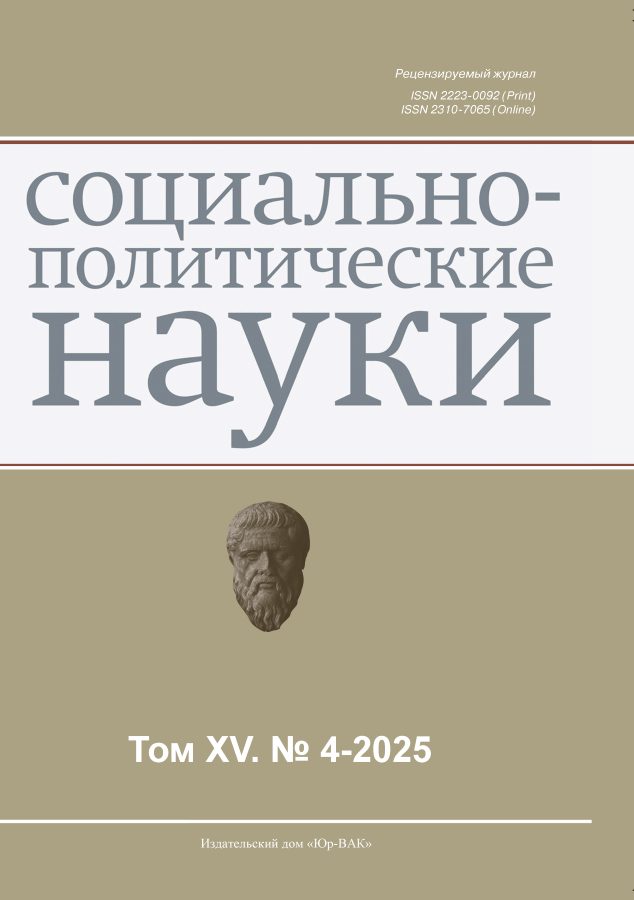Sociopolitical factors in shaping citizens’ trust in the National Guard troops of the Russian Federation
- 作者: Mufazdalov S.I.1, Dobrynina M.I.2
-
隶属关系:
- Saratov Military Order of Zhukov Red Banner Institute of the National Guard Troops of the Russian Federation
- Buryat State University named after D. Banzarov
- 期: 卷 15, 编号 4 (2025)
- 页面: 233-244
- 栏目: Social Structure Social Institutions and Processes
- URL: https://journals.eco-vector.com/2223-0092/article/view/693265
- DOI: https://doi.org/10.33693/2223-0092-2025-15-4-233-244
- EDN: https://elibrary.ru/YUSGRL
- ID: 693265
如何引用文章
详细
Public trust in government institutions is a key measure of their effectiveness, which directly determines the level of authority of these institutions in the overall architecture of the public administration system. Modern conditions characterized by dynamically changing political and economic environments, rapidly forming citizens’ perceptions regarding an ideal paradigm for ensuring public safety, are subject to transformation due to the impact of a wide range of destabilizing external and internal factors. Consequently, the role and significance of establishing stable trusting relationships between the general public and military personnel as well as employees of Russia’s National Guard Forces (Rosgvardiya) acquire special relevance and grow rapidly under the influence of both endogenous and exogenous factors. This article explores the impact of sociopolitical factors on the formation of trusting relations between the National Guard Troops of the Russian Federation and the civilian population. Empirically grounded conclusions derived from comprehensive scientific research on public perception of the new law enforcement structure – the National Guard Troops of the Russian Federation – are presented.
全文:
作者简介
Salavat Mufazdalov
Saratov Military Order of Zhukov Red Banner Institute of the National Guard Troops of the Russian Federation
编辑信件的主要联系方式.
Email: salavat1979@mail.ru
SPIN 代码: 4012-3797
lecturer, Department of Criminal Procedure and Criminalistics
俄罗斯联邦, SaratovMarina Dobrynina
Buryat State University named after D. Banzarov
Email: mid16@mail.ru
SPIN 代码: 6263-0514
Dr. Sci. (Sociol.), Professor, Professor, Department of Political Science and Sociology
俄罗斯联邦, Ulan-Ude参考
- Weber M. Economy and society: Essays on understanding sociology. In 4 vols. L.G. Ionin (comp., general ed. and preface). Moscow: Publishing House of HSE, 2016. Vol. I. Sociology. P. 3. ISBN: 978-5-7598-1513-6.
- Grigorenko B.Yu. Trust in the government as a factor of social and political activity of young people: Sociocultural aspect. Dis. ... Cand. Sci. (Sociol.). Moscow, 2013. 157 p.
- Durkheim E. On the division of social labor. A.B. Gofman, V.V. Sapov (transl. from French). Moscow: Canon, 1996. 432 p.
- Durkheim E. Sociology. Its subject, method, and purpose. A.B. Gofman (transl. from French, compiled, afterword, and notes). Moscow: Canon, 1995. 423 p.
- Merton R. Social theory and social structure. Moscow: AST, 2006. 873 p.
- Mufazdalov S.I. Model of an effective public security system: Sociological analysis. Actual Problems of Economics and Management. 2016. No. 4 (12). Pp. 90–96. (In Rus.). EDN: YHLQMT.
- Mukhametov R. Why do citizens trust the government? The origins of political trust in contemporary Russia. Sociological Review. 2023. Vol. 22. No. 3. Pp. 196–218. (In Rus.). doi: 10.17323/1728-192x-2023-3-196-218.
- Flier A.Ya. Cultural environment and its social features. Informational Humanitarian Portal “Knowledge. Understanding. Skill”. 2013. No. 2. P. 2. (In Rus.). EDN: QYXUPV.
- Flier A.Ya. Normative human behavior. Culture of Culture. 2022. No. 2. (In Rus.). EDN: JWAMEQ.
- Tsenzeria S.V., Egorov D.A. Formation of a positive image of troops’ actions as an element of information countermeasures. Academic Bulletin of the National Guard Troops of the Russian Federation. 2020. No. 4. Pp. 43–47. (In Rus.). EDN: OQWHUF.
- Shishkina E.V., Mufazdalov S.I. Issues of criminal liability for the dissemination of false information on the Internet. In: Trends in the development of modern criminal procedure legislation of the Russian Federation. Collection of Scientific Papers of the All-Russian Scientific and Practical Conference (Yekaterinburg, April 29, 2022). N.S. Rasulova (ed.). Yekaterinburg: Ural Law Institute of the Ministry of Internal Affairs of the Russian Federation, 2022. Pp. 150–158. EDN: UFDYZF.
- Hardin R. Trust in government. In: Trust and Governance. V. Braithwaite, M. Levi (eds.). New York: Russell Sage, 1998.
- Heimer C.A. Solving the problem of trust. In: Trust in Society. K.S. Cook (ed.). New York: Russell Sage, 2001.
- Huck S. Trust, treason and trials: An example of how the evolution of preferences can be driven by legal institutions. Journal of Law, Economics and Organization. 1998. No. 14 (1). Pp. 44–60.
- Levi M. A state of trust. In: Trust and Governance. V. Braithwaite, M. Levi (eds.). New York: Russell Sage, 1998.
补充文件








